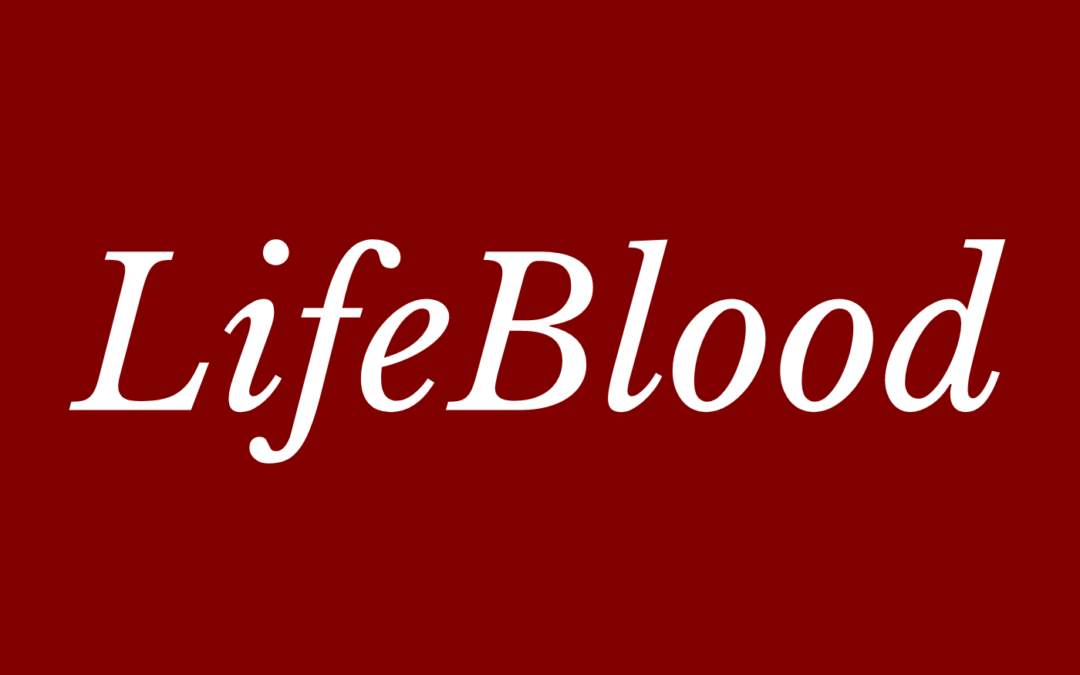Small Business Loans with Anna Serio
Is a loan the best course of action when your business is in need of money? Anna Serio shares her perspective on the questions to ask and the important factors when thinking about small business loans!
Listen to us On
About the Episode
LifeBlood: We talked about small business loans, the importance of going through a thorough fact finding process when considering applying for a loan, the different options available, and where to go for advice with Anna Serio, Certified Commercial Loan officer and Senior Writer with Finder.
Listen to learn when taking on debt may not be the best course of action for your business!
For the Difference Making Tip, scan ahead to 20:27!
You can learn more about Anna at Finder.com, Facebook, Twitter, Instagram and LinkedIn.
Thanks, as always for listening! If you got some value and enjoyed the show, please leave us a review wherever you listen and subscribe as well.
You can learn more about us at MoneyAlignmentAcademy.com, Twitter, LinkedIn, Instagram, Pinterest, YouTube and Facebook or you’d like to be a guest on the show, contact George at Contact@GeorgeGrombacher.com.

George Grombacher
Lifeblood Host

Anna Serio
Guest
Episode Transcript
Come on.
Life love. This is George G. And the time is right welcome. Today’s guest is strong and powerful Anna syrio. Anna, are you ready to do this? I am, thank you for having me excited to have you on. And it is a certified commercial loan officer and a senior writer with finder, excited to have you on Anna, tell us a little about your personal life’s more about your work and why you do what you do.
Anna Serio 0:36
Great. So I have kind of a weird background for someone who works in personal finance, I actually lived abroad for about five years, I lived in Beirut, where I was doing a master’s in Middle Eastern Studies and then worked in a newspaper.
But so I kind of became interested in personal finance based on my experience there because banking was just so difficult for me, I wasn’t a Lebanese citizen. And I needed to like cash, student loan checks, and my like paycheck. And just doing these, like really basic things that we sort of take for granted, when we’re in our home country, were so difficult. So that sort of got me thinking about like, just how other people are managing their personal finances. And when I came back to the United States, I saw that finder was hiring and I thought, hey, like, this is something that I can explore a little bit more deeply. So I started really getting into personal loans, and just trying to understand or trying to help myself and others understand how to better manage debt, I had a lot of student debt from grad school. And then I started getting interested in business loans, because that was some of my friends had started their own small businesses, and they really, you know, a lot of entrepreneurs are not experts in finance, I have one friend who is an accountant who started his own accounting company, but most of them are not like that. So, and knowing how to, like, manage that side of your business along with, you know, marketing, and you know, doing the thing that you’re actually passionate about, can be really difficult. So that’s when I decided, or I worked with my team at finder, to become a certified commercial loan officer. I typically write about financial technology companies, like online lenders that use algorithms to sort of disrupt the traditional banking system. But I wanted to also get a traditional background. So I worked with the independent community bankers of America, or icba, to get my certification and started to have a really nice dialogue with some of the community bankers that I met, they’re just like, what it what a loan is really, our head alone can really benefit a small business when it can’t, and just trying to understand like what is actually good deal for business, which is kind of difficult to know as a lay person, because business lenders in particular don’t have a ton of regulation, so they don’t have to be very upfront about the cost of financing project, that product, which is kind of crazy. So yeah, that’s basically how I ended up doing what I do, which is I just write about the business lending products and personal loan products still too. And also just write guides to know basic things related to business loans, like during the Coronavirus, I was one of the first people reading the paycheck protection program like legislation that was coming out in just breaking it down into digestible terms so that it was easier for small business owners to understand exactly the practical information you need to like apply for this type of financing that was so essential to so many small businesses during the pandemic.
george grombacher 4:32
Yeah, absolutely. He just just just immensely valuable So what was it that motivated you to go study in Beirut for five years? That is a think that that’s awesome. I’m sure that we could talk for hours just about that. But what was the motivation?
Anna Serio 4:49
So I was a creative writing major in college. I’ve always loved poetry and I worked for a small press that did translation and I took Arabic as a as an elective, and I sort of fell in love with the just the structure of the language and thought that maybe I would become a translator and an academic. So I realized very quickly that it’s difficult to learn any foreign language, but especially Arabic In the United States, you really have to go to another country to get a sense of that language and, like, actually talk to people and have people you know, like, yell at you. Until you understand. So I, yeah, so that’s why I ended up I ended up going there just to strengthen my language skills and get it understanding a better understanding of Arabic literature and history. Before, like, theoretically, applying for a PhD program, but yeah, by the end of that, I just didn’t know how useful that would actually be. Just for myself, and for other people, I kind of wanted to do something that would make more of a difference in people’s lives. So yeah, I don’t know how I ended up there. It was people always assume I had some sort of political motivation, but I really it was like, a very linguistic choice.
george grombacher 6:19
Amazing. I think that’s incredible. And how, when, when you look back on that time, if you don’t mind, where, what, what, what, what part of the world did you grow up in?
Anna Serio 6:30
So I was born and raised in New York City. I really, I wanted to leave so badly for college. But I got a really, really good deal at City University of New York, they, I was a part of this program that they gave us money to travel, like a free computer and free housing, it was just like, like, the able to graduate from college without debt was. Yeah, it’s hard to pass
george grombacher 7:00
up. Now for sure. So New York City’s obviously, you know, just this wonderful and unique, diverse place, but certainly spending five years where you did, how did that shape your perspective you have now.
Anna Serio 7:19
Um, I think that it’s interesting, because I did feel very culture shocked when I came back. I think that like when you’re in a place, you really sort of start to embody or like live inside of the way that other people think, or no, I don’t know exactly to say this, but I guess like bubbles are like a real thing. And it’s interesting to go back and forth between different bubbles. So I think that sort of gave me an understanding of the fact that you know, different people, perspectives are like shaped by where they are and who you’re talking to, to like a really crazy degree and that, like, it’s very difficult to change that. So I think it just made me more empathetic to people that I didn’t necessarily agree with every thing that also made me understand how powerful
george grombacher 8:22
Well, hopefully you broke yourself with that habit of being compassionate and empathetic to other people’s situations. Just kidding. So, so certainly now, I thought it was I thought it was cool that you had the opportunity to interface and Connect and Learn from folks working for, or working with this independent community bankers group. Because certainly their perspective on lending is different than if I were just to go and apply for a loan from one of the huge banks. So you mentioned what a good deal is for a business owner. Do you want to talk a little bit about that?
Anna Serio 9:01
Yeah, so I think that when I was a more people, okay, when people are looking for a business loan, I think they are often looking for, you know, like a really low rate terms that gives them a low payment, and the right amount of money for the thing that they’re trying to find. And I think those are all very important. And one thing that you’re missing I think, from a big bank, or an online lender is sort of the like guidance through the lending process that you can get with a community bank, or some credit unions also offer business loans and can offer this sort of like hands on experience. Because sometimes people are looking for the wrong type of financing and they don’t even know it. So even if you get like a relatively low rate on the wrong type of loan, you’re like actually going to lender, land yourself in a worse financial situation or if you take it alone. When you actually should consider a different type of financing, like maybe investor financing, because your business just can’t handle the debt, then no business loan is a good deal. So that was sort of what we are one of the things that I took away from that training and those relationships that I’ve developed.
george grombacher 10:22
That certainly makes sense. So all right, and I imagine that you’ve got tons and tons of articles that you’ve written about this, or if you haven’t, you really ought to, if if, if you’re, if, if I came to you, and I said, I’ve got this, this, I have a business, and we’re successful, but we’re looking to grow and take on money. What do you think I should do?
Anna Serio 10:47
Well, it depends on how you plan on growing Do you want to? it? It depends on what you’re trying to finance? Are you trying to finance? Like a bigger office space? Are you trying to purchase more real estate? Or do you just want to like hire more staff? I think generally, taking out a loan makes sense if you have some sort of a self liquidating asset that you can back the loan with. But if you want to hire more stuff, that staff isn’t necessarily a self liquidating asset. So taking it alone might not actually be the best option for you. If that makes any sense. Yeah.
george grombacher 11:31
So you say self liquidating, that means if I bought, if I bought a huge machine to manufacture something that would be a self liquidating asset?
Anna Serio 11:39
Yeah, that’s like the best example of a self liquidating asset, it’s something that will produce reliably produce a certain amount of money for a specific amount of time, that’s like very easy to estimate. Equipment financing is incredibly safe for lenders and for borrowers. And that’s why it has like some of the lowest interest rates and also are the highest, I think it has the highest approval rate, compared to any other type of financing last year, which is makes sense, because it’s incredibly, if you don’t pay off the loan, then the lender takes the asset and sells it for essentially the value of what you owe on the loan. So it works out pretty well.
george grombacher 12:18
Yeah, that certainly makes sense that that is a good deal from for everybody, one of those win wins that we hear about every so often. So let’s, let’s just assume that that I’m your friend who has an accounting firm, and he or she says, you know, hey, we’ve got this great idea, and we’ve got great traction, it’d be awesome to be able to get some more space and hire some more folks.
Anna Serio 12:43
Oh, what types of financing they should send or? Yeah, I mean, I think it depends on the market. I think right now, maybe taking on debt isn’t the best idea. If you’re trying to grow because the market is so volatile, especially with the supply chain disruptions and the labor shortage. I think taking out a line of credit, if you’re trying to grow in that capacity, where you have a lot of different types of expenses that are difficult to predict ahead of time might be your best option. Often those you can have for a long period of time, and they can cover emergency expenses, too, that you didn’t think would come up, and that can help you avoid really high cost short term financing, which is something you definitely have to stay away from, if possible.
george grombacher 13:33
Yeah, for sure. I appreciate that. So so the different for lack of a better term buckets of money or financing options that are available, talked about the equipment financing, which seems to be pretty, pretty straightforward. Talked about a line of credit. Our SBA loans, something that the that you think about or
Anna Serio 14:00
Oh, boy, do I think about SBA loans? Yeah, it’s I you know, I’ve heard a lot of mixed. I think so. I think SBA loans are great personally. But I do know some community bankers who think that they sort of enable small businesses that maybe shouldn’t be taking a loan because it is too risky for them to get access to financing. The way I think that SBA loans really helps small business owners is that people who are maybe parts of groups that would don’t have a lot of like generational wealth, are underrepresented in business communities. They often have a really difficult time getting a bank loan, even without discrimination. Like if we took that off the tables or your personal wealth has a huge impact on what kind of financing you can get when you’re just starting a business. So the SBA loan kind of levels the playing field for us. Women in like people of color. So that’s what I like about SBA loans. They have a really low approved approval rate, actually, which is something that I think some small business owners are surprised by that application is really intense, and just takes forever to get funded. You can’t like they have some Express loans that take like a month instead of like, I don’t know, three months than it normally takes. So you have to really, really be in it for the long haul, and be prepared to spend a lot of time on an application or hire a company to do the heavy lifting for you, which for a fee. So like, if the fee doesn’t actually like ends up, like adding up, then sometimes you won’t save as much money as you thought you would, because either you’re losing time, but you could be spending on your business or paying someone else to help you with the application.
george grombacher 15:59
Yeah, that certainly makes sense. So I, I imagine wise counsel is when you are considering financing sounds like we need to really figure out what it is that we’re trying to accomplish. And just kind of correct me where where I’m going astray here. But look at all the different avenues that are available to you, not just what you sort of think, Oh, I you know, I need money to get one of those SBA loans. And then are there certain questions I need to be asking on top of that?
Anna Serio 16:35
Um, yeah, I think like, asking whether financing your business is the right option is a question that some small business owners are afraid to ask themselves. Sometimes taking out debt or bringing on investors even is not a good idea. Sometimes you just if you have a small business, especially it’s closing your business can be a better idea than trying to throw more money at a problem, you’ll end up in a lot more debt. Most business loans are personally guaranteed. So after you lose your source of income are also going to be you know, gonna have to pay back the business loan or like whatever the balance that you have left.
So yeah, I think it’s something that we dance around a lot. Because it’s such a hard topic to talk about. But yeah, knowing, like asking yourself is, do I need to throw money at this? Or do I need to, like, take a step back? Or just shut things down?
is a question you should also ask. Growth also, is a little bit trickier than some small business owners might assume. Because you can grow yourself out of business really easily. If you expand operations, and you aren’t able to sustain that level of revenue, and and you have like a lot of staff and just like costs. And your sales aren’t as high as they were when you first grew, then that can shut you down really quickly.
george grombacher 18:20
I think that certainly makes a lot of sense. It’s like, okay, you’re thinking about financing, thinking about bringing money in? Why? Well, if it’s to sort of stop the bleeding, and to save the business, that’s maybe not necessarily the right thing. And maybe really ask yourself that super, super hard question of maybe just close and seek a different opportunity in the future. And also the danger of eyes being too big or bigger than the stomach and taking on trying to grow too fast. Both are different problems, but equally damaging, well, maybe not equally
Anna Serio 18:58
damaging in different kinds of ways. I think, one, there are a few good resources that business owners can turn to if they’re like really not sure what the right choice is. The SBA partners with a lot of nonprofit small business owners that offer free counseling to entrepreneurs, and they can help you decide what kind of financing you should look for or, you know, have a hard conversation about like when you should shut down small, small banks. community banks often also kind of provide this kind of counseling. If you just like set up a meeting with a loan officer, they should be able to like talk you through like what is actually a good option for your business. So they can give you personalized advice based on their own experience with other similar businesses and like taking a deep dive into your, you know, financial reports. So it’s hard to like really give any Any advice without taking a deep look at? Like what the numbers actually are?
george grombacher 20:07
No time for nuance. And we got 20 minutes. I need I need yes or no. I’m just kidding. Of course, I think those are, those are awesome resources that the that I will 100% link in the notes. So I and other people are ready for your different speaking tip. What do you have for them?
Anna Serio 20:27
My difference making tip is don’t take out debt unless it will benefit you in the long run.
george grombacher 20:34
What? I think that that is great stuff that definitely gets a Come on. Come on. You’re giving me a short answer there, Anna. And so I jumped in with the command. But I think I did it too early. So please, please finish your thought.
Anna Serio 20:51
Oh, yeah. I think that sometimes people think about that as something that will just allow them to like access a thing that they want, sooner than they would have it if they hadn’t, if they decided to save up, but the best types of loans will actually improve your personal finances, by allowing you to invest in something that will give you an even higher return. Like for example, consolidating credit card debt, credit cards have a really high interest rate. But if you take out a personal loan with a lower interest rate, you’ll actually save money in the long run for taking out a like a personal loan to make a small improvement to your house that will increase the value of your property is also a great way to sort of take on debt, but use it wisely.
george grombacher 21:49
Love it. Use debt for good instead of evil Anna.
Anna Serio 21:53
Yes.
george grombacher 21:56
Thank you so much for coming on. Where can people learn more about you? How can they engage with you?
Anna Serio 22:00
Um, you can find my articles on finder calm. My email is right. And my author bio, which is on pretty much every article I’ve written, I believe. Yeah, send me a question if you have one. I’m also on LinkedIn, and Twitter, although I don’t really tweet so. And those are all in my author bio as well.
george grombacher 22:22
Perfect. Well, if you enjoyed this as much as I did, show me your appreciation and share today share with a friend who also appreciates good ideas go to find her.com and to check out everything that Anna is reading and thinking about, I’ll list that in the notes of the show. Thanks again, Anna. Thank you, and until next time, keep fighting the good fight. We’re all in this together.
Transcribed by https://otter.ai
More Episodes
Why am I broke? Stop Doing these 4 Things Immediately
Asking, “Why am I broke?” is a really important thing to do. The sooner you can answer it, the sooner you can get on track to reach your financial goals. And that’s really important because money has time value. Meaning, the longer you have to invest, the...
Is it Bad to Give Your Boyfriend Money?
Is it bad to give your boyfriend money? Probably. Money is a powerful thing. It’s been the root of all evil. Other times, it’s been responsible for wonderful, world-enriching innovation. What does your gut tell you will happen here? When you go through a...
How to Handle a Money Imbalance in Relationships
I think it’s a good thing you’re asking about a money imbalance in relationships. It’s a common occurrence that’s not talked about enough. And that’s a problem. The #1 reason couples divorce is infidelity. Behind that, money is #2, and a lack of communication is #3....
Should I Get Life Insurance in My 20s?
“Should I get life insurance in my 20s?” It depends. Do you love somebody? Do you owe somebody? If you answered “yes” to either of those questions, get life insurance. If you answered “no,” it’s probably unnecessary. Life insurance can be a critical...
How to Improve Your Cash Flow in 4 Steps
You’re asking how to improve your cash flow, and that’s the right question to ask. I’m going to share 4 steps you can immediately take in service of doing exactly that. The first is easy. Second one's simple. The third and fourth will require more thinking and doing,...
How to Simplify Your Budget
If you’re wondering how to simplify your budget, you’re in good company. Complexity keeps many of us financially stuck. How many times have you decided to make a proactive financial move, only to have your progress stalled because what you were trying to do got...
How to Have a Bright Future for Yourself and Your Money
We all want a bright future. How often do you find yourself thinking like this? “One day, I’ll have that. Someday, my family and I will do that.” I know I used to have a lot of passing thoughts like that. I’d see something on the internet I thought was cool and...
I Hate Money: Why and How to Stop Thinking that Way
When someone tells me, “I hate money,” I instinctively ask, “why?” So why do you hate money? Like everything else, money is neither good, nor bad. It just is. It’s true that money has been behind limitless stress and anxiety, and that it’s paid for...
Why Am I Broke? Five Steps to Financial Security
You’re asking, “Why am I broke?” While I don’t know the details of your situation, I’m confident I can help. Whether you’re the victim of unfortunate circumstances, or your wounds are self-inflicted, following the five steps I’m going to lay out can help...
Join the show.
Interested in being on the show? Tell me a little bit more about you and what you’d like to talk about!














